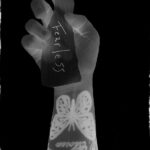
Guest Blog #1
January 7, 2024
Fearlessness: Guest Essay #3
February 5, 2024FROM CHILD’S COUGH TO A MOTHER’S ROAR
by Catherine Shields
Research shows that disabled people find it hard to access health care and medical supplies especially when the resources become scarce. Unfortunately, I came face to face with these facts in the fall of 2022.
It happened late Saturday evening, long after I picked up my adult daughter from her group home for our routine weekend visit. Maria, the worker on duty who had recently arrived in this country, answered the door. She barely spoke English, but she gestured at the bottle of cough medicine, then shook her head. My daughter Jessica stood behind her, hacking, a coarse, gravely sound.
What if it’s Covid? I tamped down my fear about bringing Jessica home. Although my seventy-year-old husband was considered high-risk, I told myself Jessica had a booster a month earlier. But six hours later, her cough worsened. Her temperature shot up to 103. Husband said her cough didn’t sound like ordinary bronchitis. We sorted through our closet and found stashed Covid tests. Five minutes later, I gazed in horror at the faint red line.
“I no have Covid,” Jessica cried. “I sick.”
My husband and I argued about what to do next. It was eight thirty p.m., but he insisted I call the doctor’s service and leave a message. In the background, Jessica protested, “I no have Covid.”
Thankfully, the doctor called back within fifteen minutes. “Take her to the closest emergency room,” he said. “You’re not going to make it to Urgent Care. They close at 9.”
Closest emergency room was six blocks away. But I’d heard terrible things about it. The doctor gave more instructions. “When you get there, tell them she is a high-risk patient. If you have any problem or they don’t help you right away, call me back. This is my cell number.”
I wrote everything down.
We arrived at half past nine. The waiting room overflowing, Jessica gripped my arm, simultaneously whimpering, shivering, and coughing. When her name was finally called, the triage nurse handed me a clipboard with forms. I returned it five minutes later, and the same nurse asked Jessica to state her name and birthdate. I answered the questions, but she glanced up from her chart, the disdain apparent. She said, “Mom, I need your daughter to answer for herself. Can she even understand me?”
I recognized the gaze. It was the look of someone who had already formed an opinion. I had forgotten to bring the Healthcare Surrogate form, but it might not have made any difference.
“Yes, she understands you,” I snapped, “but she’s too sick to respond.” It irritated me that she had called me “Mom,” but what infuriated me was the question. The nurse didn’t look up when she said, “I have the information needed, Mom. Take a seat.”
I walked Jessica to the back of the waiting area. Across from us sat a girl wearing pink pajamas. Her cough sounded exactly like Jessica’s. She slumped against a woman I assumed was the mother. The two of them held hands. The mother offered reassurances in Spanish, but when I asked how long they’d been waiting she didn’t answer.
A nurse in pink scrubs exited the automatic double doors which led to the inner chamber of the ER, a blanket draped over one arm. She pushed an IV pole, then headed over to the young woman and said something in Spanish, before she inserted the IV into the girl’s arm.
Waves of fear and anger tightened my throat as I twisted my fingers together and asked when we’d be seen. She didn’t know.
A symphony of hacking and wheezing echoed around me. We were drowning in a sea of sickness. The scent of disinfectant couldn’t mask the odors. There was a parade of stretchers carrying bloodied people strapped to gurneys with police officers following them, people vomiting in trash cans.
During the next few hours, I approached the reception desk inquiring about our place in line. It was close to three a.m. when Jessica was called in for a chest x-ray. Afterward, we returned to the waiting area. We still hadn’t seen a doctor.
I’d finally given up beseeching my doctor with calls for help. Our last text was just before midnight. New patients arrived, some with minor complaints, some brought by ambulance and immediately wheeled through the double doors. Seven long hours passed and at four a.m., a nurse in green scrubs informed me the doctor reviewed Jessica’s chart and he was prescribing cough medicine. I could take her home.
Enraged, I screamed, “You can’t send us home. The doctor hasn’t even examined her.”
The nurse stepped backward and sniffed, “I’m afraid the doctor is busy seeing other patients. He read the reports, and this is what he is prescribing.”
I pointed at the empty seats across from us. “There was a girl who sat across from us four hours ago. You came out and administered an IV.” Emboldened, I raised my voice. “I’m not leaving until my daughter gets treated. If you refuse, I’ll make sure every social media outlet, newspaper, and television station hears about this.”
I was surprised that it worked. Five minutes later, Jessica and I were led to a small examination room, where the nurse posted a large quarantine sign on the door and drew the curtains. There were additional forms to complete. Then Jessica got the infusion.
Five a.m. I no longer felt invisible.
Clearly, the ER department was overwhelmed, but I couldn’t shake the feeling of neglect. Nor could I forget our long night in the emergency room. Although I decided it would be pointless to register a complaint, when I received the survey a week later, I gave it all zeros. There was an area to insert comments, so I wrote about my daughter’s treatment. The response elicited a form letter from the hospital administration, but it was basically another survey asking for further details. No one called.
I swore I’d never step foot in that hospital again, but perhaps my feedback will play a role in prompting changes with that ER. Perhaps my comments will contribute to a conversation about how to provide more inclusive and equitable healthcare for all individuals, regardless of their abilities.
Catherine (Cathy) Shields writes about parenting, disabilities, and self-discovery. In her debut memoir, The Shape Of Normal, A Memoir Of Motherhood, Disability And Embracing A Different Kind Of Perfect, Cathy explores the truths and lies parents tell themselves. Her book was named a category WINNER in the 2023 American Writing Awards, and her writing has twice been nominated for a Pushcart. Her essays have been published in NBC Today. Newsweek, Bacopa Literary Review, Grown and Flown, Brevity Blog, Mother Magazine, U Revolution, and Write City Magazine. Cathy resides in Miami, Florida with her husband. They enjoy taking long bike rides and kayaking. Follow her on Instagram @cathyshieldswriter or visit her website at https://www.cathyshieldswriter.com

